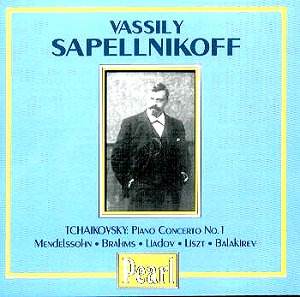Born in Odessa in 1868 and a pupil of Sophie
Menter, herself a famous Liszt pupil, Sapellnikoff faced the Harold
Bauer conundrum of whether to concentrate on piano or violin.
Gradually his superiority as a pianist won and he began work on
his eventual repertoire of twenty-five concertos, found time to
compose (though he was always a soloist-composer and not a composer-soloist)
and also to meet Tchaikovsky. This happened on an 1888 tour of
Germany when Sapellnikoff promoted the former’s Concerto in B
flat, which he did to the composer’s obvious satisfaction and
pleasure. Sapellnikoff’s subsequent career was distinguished,
with numerous world tours and long spells teaching, principally
in Moscow. He died at around the same time as his great contemporary
Emil von Sauer – though Sapellnikoff died, pretty much a forgotten
man, in San Remo in 1941. He made no recordings during the last
decade or so of his life – or, to be more exact, surveying the
matrix sheets one can see he did record for fledgling English
Decca in 1929 but the recordings were never issued. In what landfill
site, one wonders, lie the broken Decca masters of Sapellnikoff’s
recording of Rachmaninov’s second concerto (with Basil Cameron
and Julian Clifford conducting, due to remakes) – or indeed the
solo sequence he was known to have recorded, Liszt’s Polonaise
No. 2, the Schumann-Liszt Wildmung and his own Gavotte No. 1?
Still, we must be grateful for what we have -
a number of sides for English Vocalion, recorded between 1923
and 1927. The last few discs were electrically recorded – Vocalion
not embracing the new technology and its investment complexities
until long after its British rivals Columbia and HMV (and not
lasting much longer, squeezed by the Big Two). The most important
document Sapellnikoff left to posterity was the first ever recording
of the Tchaikovsky he had so adroitly performed with the composer
in Germany. This has nicely divided listeners in the seventy-five
years since it was first issued. Some find it strait-laced and
dull, others admire its reserve and musicianship. The former deplore
its lack of bravura, the latter elevate its musical conscience
in refusing to yield to octave flourish. For what it’s worth I
like it very much, for all the incidental and ancillary problems.
These include the occasionally problematical late acoustic sound
and the cuts (to be expected). But as against this one can appreciate
Sapellnikoff’s intense musicality, the clarity he favours, his
excellent first movement cadenza. Though a small and not really
very virtuosic band, the wind choirs make a characterful showing
and support their soloist manfully. The second movement has delicacy
and finesse and a strikingly reserved nuance. The finale has real
nobility and though not paraded as such real digital security.
First recordings tend to be bracing and are always instructive
– and this no less so than any other given the pianist’s earlier
association with Tchaikovsky.
The smaller pieces are ideally selected to illustrate
Sapellnikoff’s clarity and winning filigree. The Mendelssohn is
full of that hallmark clarity and the Schumann is deliciously
animated. His deft voicings in the left hand elevate the Brahms
Hungarian Dance and he brings graceful simplicity to Liszt’s Valse
Impromptu. He shares Liszt pupil Frederic Lamond’s general approach
to Gnomenreigen – measured but perhaps with a slight admixture
of dark wit that the Scotsman abjured. Elsewhere pearly treble
runs light up the Wagner-Liszt Spinning Song and his forthright
musicality makes the Alabiev-Liszt live. The Rubinstein Staccato
Etude is a rather dull sounding 1927 electric but Sapellnikoff
impresses in Balakirev’s Mazurka – real engagement and real style.
In Tchaikovsky’s Humoresque he knows just how to deal the deadpan
charm and his Liadov is really delightful – wit in abundance.
His own Gavotte ends the recital, a compound slice of baroquerie
and "wrong note" teaser lashed with romantic tracery.
Delicious.
Allan Evans’ notes set the scene well and include
some autobiographical reminiscences from the pianist – piquant
and full of Revolutionary era escapades – as well as Tchaikovsky’s
own recollections of that 1888 German tour. The transfers, by
David Contini, sound really very successful. Sapellnikoff’s 78s
sell at around £35 each on the market today. You can save yourself
years of searching and a small fortune if you buy this little
jewel of a disc.
Jonathan Woolf

